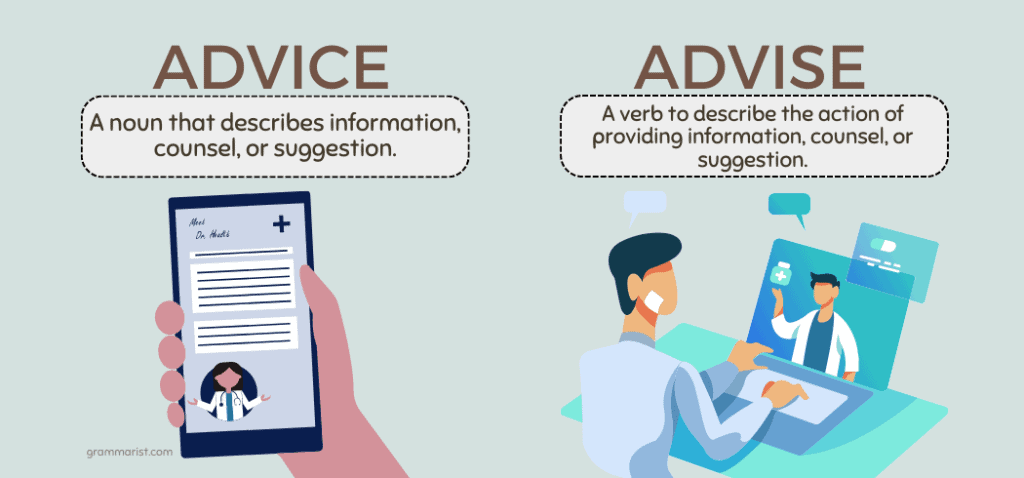You aren’t alone if you don’t know the difference between advice and advise. These words not only look alike, but they also sound similar and are related by a similar definition as well.
This confuses not only English language learners but also native speakers.
Despite their similarities, they function very differently in speech and writing, and it is important to use them correctly in order to avoid confusing your audience. Below, we define the differences, show you how to use each word, and provide examples of advise and advice to help you remember which one is which.
What’s the Difference Between Advice and Advise?

The main differences between these two words are the grammatical form of use and the differences in spelling and pronunciation. Both words deal with information, counsel, or suggestions, but their parts of speech are different.
Advice is a noun that describes information, counsel, or suggestion. Advise is a verb to describe the action of providing information, counsel, or suggestion.
Advice Meaning and Use
Advice is a noun and represents information, counsel, or a recommendation about what could or should be done.
It is pronounced uhd-vise, and advice rhymes with “ice.”
For example:
- I’m offering you this expert advice for free, so you might as well accept it.
- She gave him bad advice concerning the completion of his homework.
- I will accept your overdue advice on one condition, that you cheer for me when I graduate.
- The advice column was printed in the Sunday newspaper.
- She went to her counselor seeking legal advice.
Origin of Advice
Advice is a late 13th-century word from the Old French auys, meaning “opinion,” and avis, meaning “a judgment, view, idea, or opinion.” Both stem from the phrase ço m’est à vis, or “it seems to me.”
It was ultimately from the Latin word visum, meaning “to see.”
Advise Meaning and Use
Advise is a verb. It means to actively give counsel or offer recommendations about something.
It is pronounced uhd-vize, and advise rhymes with “wise.”
For example:
- How will you advise her to apply for the scholarship?
- My teacher always advised me to do the correct thing, even when it was difficult.
- I advise you to pay close attention to what happens in the next few weeks.
- My boss advises his staff to always double-check their time cards to ensure proper, timely payments.
- I’m advising you to find a good financial advisor before you decide to purchase that home.
Origin of Advise
Advise is from the late 13th-century Old French word avisen, meaning “to view or to consider.” In the late 14th century, the word became aviser, meaning “to reflect, consider, or deliberate.”
Avisen and aviser also originate from the French avis, meaning “a judgment, view, idea, or opinion,” and have the same Latin visum influence as the word advice.
How to Remember the Difference
Keep in mind the following pattern of word endings to help clue you into the correct spelling and use of advice and advise.
- Advice, ending in -ice, is the same as ice, which is a noun. Most nouns end in -ice.
- Advise, ending in -ise, is usually the ending of a related verb form such as devise or advertise.
Let’s Review
Advice is a noun and is what you provide to a person when they are seeking information, opinion, or suggestions. Advise is a verb and is the act of providing information, opinion, or suggestions.
They are not only spelled differently but also pronounced differently. Despite being easy to confuse with one another, they serve very different purposes. Remember the ending of advice, -ice, and apply it to the word ice to help you remember it works as a noun in speech and text.

Comments are closed.